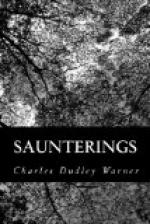The review, which had been a good deal talked about, came off in the afternoon; and all the world went to it. The avenues of the Bois were crowded with carriages, and the walks with footpads. Such a constellation of royal personages met on one field must be seen; for, besides the imperial family and Albert Edward and his Danish beauty, there was to be the Archduke of Austria and no end of titled personages besides. At three o’clock the royal company, in the Emperor’s carriages, drove upon the training-ground of the Bois, where the troops awaited them. All the party, except the Princess of Wales, then mounted horses, and rode along the lines, and afterwards retired to a wood-covered knoll at one end to witness the evolutions. The training-ground is a noble, slightly undulating piece of greensward, perhaps three quarters of a mile long and half that in breadth, hedged about with graceful trees, and bounded on one side by the Seine. Its borders were rimmed that day with thousands of people on foot and in carriages,—a gay sight, in itself, of color and fashion. A more brilliant spectacle than the field presented cannot well be imagined. Attention was divided between the gentle eminence where the imperial party stood,—a throng of noble persons backed by the gay and glittering Guard of the Emperor, as brave a show as chivalry ever made,—and the field of green, with its long lines in martial array; every variety of splendid uniforms, the colors and combinations that most dazzle and attract, with shining brass and gleaming steel, and magnificent horses of war, regiments of black, gray, and bay.
The evolutions were such as to stir the blood of the most sluggish. A regiment, full front, would charge down upon a dead run from the far field, men shouting, sabers flashing, horses thundering along, so that the ground shook, towards the imperial party, and, when near, stop suddenly, wheel to right and left, and gallop back. Others would succeed them rapidly, coming up the center while their predecessors filed down the sides; so that the whole field was a moving mass of splendid color and glancing steel. Now and then a rider was unhorsed in the furious rush, and went scrambling out of harm, while the steed galloped off with free rein. This display was followed by that of the flying artillery, battalion after battalion, which came clattering and roaring along, in double lines stretching half across the field, stopped and rapidly discharged its pieces, waking up all the region with echoes, filling the plain with the smoke of gunpowder, and starting into rearing activity all the carriage-horses in the Bois. How long this continued I do not know, nor how many men participated in the review, but they seemed to pour up from the far end in unending columns. I think the regiments must have charged over and over again. It gave some people the impression that there were a hundred thousand troops on the ground. I set it at fifteen to twenty thousand. Gallignani




